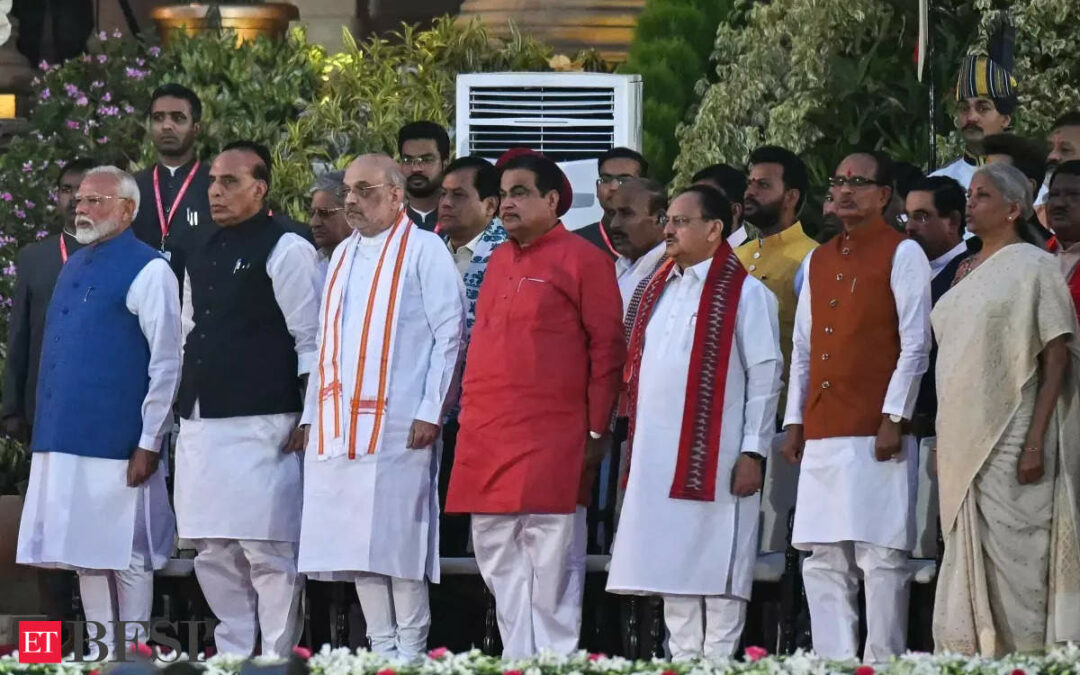As the new government has been formed and ministries have been assigned to the Union Cabinet Ministers, the BFSI industry — from bankers to economists, NBFC leaders to insurance CEOs have started pouring in their expectations and list of industry asks from the newly formed government.
Top Bankers of India expect the new government to give its final view on the PSB divestments, and further expect the government to lower fiscal deficit and interest rates and introduce measures to enhance credit growth, especially for SMEs.
ALSO READ: Policy continuity, reduction of rural economy distress & job creation boost if NDA comes to power: Economists
Veteran banker & economist Madan Sabnavis believes that lowering the fiscal deficit is the main expectation of the banking sector as this will lower the borrowing programme of the government and leave more resources to lend to the private sector. Also, it will help in keeping interest rates lower.
| Union Finance Minister Nirmala Sitharaman has consistently underscored fiscal prudence as a top priority, with the aim of reducing the fiscal deficit to 4.5 per cent by FY26. Bankers expect a lower fiscal deficit as that will lower the borrowing programme of the government and leave more resources to lend to the private sector. |
“Tax benefits like increasing savings in time deposits as part of income deductibles will help savings growth as well as banks to garner deposits,” said Madan Sabnavis, Chief Economist, Bank of Baroda.
He further added that the government has already given a long-term view on divestment in PSBs and the final view and progress on this subject is something that would be of interest to the banking sector.
| The mega consolidation, which took effect from April 1, 2020, saw 10 public sector banks consolidate into four — Oriental Bank of Commerce and United Bank of India merged with Punjab National Bank; Syndicate Bank merged with Canara Bank; Andhra Bank and Corporation Bank merged with UBI; and Allahabad Bank with Indian Bank. Bankers expect a final view and progress on the PSB divestments from the government. |
Speaking for the banking fraternity, K Paul Thomas, MD & CEO, ESAF Small Finance Bank said, ” We request the new government to extend its support for various financial inclusion activities, particularly in aspirational districts. We seek measures to enhance credit growth, especially for small and medium enterprises and critical sectors of the economy, through targeted credit schemes, risk mitigation strategies, and supportive policies that encourage lending.”
He added that continued investment in digital infrastructure is also vital, as it will enable banks to better serve their customers and improve operational efficiency.
The bankers further expect the government to have measures to further boost consumption through tax breaks, boost investments through PLI-like schemes for SMEs, initiatives for ease of doing business and enhance transparency and more.
The SFB CEO said that it is crucial that the government continues its initiatives to promote ease of doing business. Simplifying regulations and enhancing transparency are essential for nurturing a business-friendly environment.
“Additionally, I anticipate an increase in government spending on infrastructure and development projects, particularly in rural areas. This will not only boost economic growth but also ensure that the benefits of development are more evenly distributed across the country,” he stated.
The new government should encourage private sector enterprises to create more jobs. This can be effectively achieved by offering incentives such as tax discounts and Production-Linked Incentives. Such measures will stimulate employment and drive economic progress.K Paul Thomas, MD & CEO, ESAF Small Finance Bank
Furthermore, he added that the continuation of the digital push is imperative.
“Expanding digital infrastructure and promoting digital literacy will play a significant role in modernizing our economy and making it more resilient and competitive on a global scale,” he asserted.
Sabnavis highlighted that the government should have measures to boost consumption which can be through tax breaks.
He further said that it should boost investment by providing a PLI-like scheme for SMEs.
Sabnavis also expects the government to maintain capex at the present rate, forge FTAs to improve export growth and focus on improving farm productivity in general.











